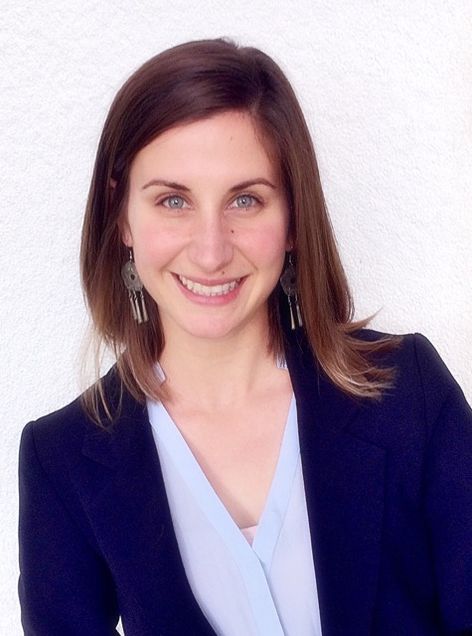Kyra Berasi (’15) Joins the Center for Reproductive Rights
A BU Law Public Service fellow, Berasi has launched her career in Washington, DC.
 Kyra Berasi (’15), a federal policy & advocacy fellow at the Center for Reproductive Rights in Washington, DC, points to the Supreme Court docket when she says that “it’s a really exciting time to be doing this work.” The center currently has a case before the Supreme Court: It represents medical caregivers in Whole Women’s Health v. Hellerstedt, which concerns a Texas law that singles out abortion providers, and does not apply to other, comparable medical procedures. This Supreme Court term, the center has also filed an amicus brief in support of the federal government in Zubik v. Burwell, which addresses the issue of whether religious non-profit organizations should be exempt from the Affordable Care Act’s contraceptive mandate.
Kyra Berasi (’15), a federal policy & advocacy fellow at the Center for Reproductive Rights in Washington, DC, points to the Supreme Court docket when she says that “it’s a really exciting time to be doing this work.” The center currently has a case before the Supreme Court: It represents medical caregivers in Whole Women’s Health v. Hellerstedt, which concerns a Texas law that singles out abortion providers, and does not apply to other, comparable medical procedures. This Supreme Court term, the center has also filed an amicus brief in support of the federal government in Zubik v. Burwell, which addresses the issue of whether religious non-profit organizations should be exempt from the Affordable Care Act’s contraceptive mandate.
As a fellow, Berasi’s days are varied. She works with a number of different coalitions, where she strategizes with people from other organizations that advocate for reproductive rights. She also works with colleagues from different departments at the center; her work on federal policy means that she collaborates with colleagues working in both domestic and international legal programs. She completes both short- and long-term legal research and writing projects, such as the Zubik amicus brief and drafting regulatory comments for the civil rights provision of the Affordable Care Act.
“When I began law school, I was interested in pursuing work related to civil rights and gender issues, somewhat broadly,” Berasi says, “and different classes, experiences, and opportunities I had as a law student led me to see the dynamic and important nature of reproductive rights advocacy.” Berasi says that her coursework at Boston University School of Law, and her relationships with Professor of Law and Anthropology Khiara M. Bridges, for whom Berasi provided research assistance, and Paul M. Siskind Research Scholar and Professor of Law Linda McClain, who supervised Berasi’s journal note, helped her “understand how issues related to reproductive rights fit within a broader range of civil and human rights issues, and intersect with other areas of the law.”
Berasi speaks highly of the school’s faculty, which she said attracted her to BU Law during the application process. “This is something I found since day one at BU,” she says. “If I reached out to professors or stopped by their office with a question or an interest, they were ready to engage, and I felt like they were really dedicated to their students and to their work. That’s something I had been looking for in a law school, and it definitely rang true in my experience.” In addition to her coursework, Berasi participated in the law school’s Civil Litigation Program’s Employment Rights Clinic, where she represented clients in hearings in front of the Department of Unemployment Insurance. She was also president of the Women’s Law Association and symposium editor of the International Law Journal.
A career-defining opportunity
Berasi’s fellowship at the Center for Reproductive Rights is funded through BU Law’s Public Service Fellowships program. The school awards exceptional third year students a one-year, full-time fellowship, which enables them to launch their public service careers by working at nonprofit organizations and government agencies.
“This fellowship has been a really extraordinary opportunity for me,” Berasi says. “When you’re working in the nonprofit world, funding is always something you need to consider when you’re looking for opportunities. My fellowship funds my position at the center, which means that I’m able to get my foot in the door in DC. This has enabled me to interact with so many different organizations and people who are doing policy work. I’ve learned about how policies are advanced, and the people who are driving these developments.”
Berasi also notes that the support behind her public service fellowship speak to the School’s commitment to helping its graduates work in the public interest. “The fact that BU has these fellowships is remarkable,” Berasi explains. “I was able to meet the benefactor of my fellowship after I got to DC, and I know that he had been in touch with Dean O’Rourke and others at the School. I could tell from the range of people involved in making these fellowships happen that the school is really invested in them—in terms of the funding provided, and in the time put into coordinating these projects and considering applicants.”
Berasi is currently considering a range of opportunities to take on once her fellowship ends. She says that the varied work she’s done, from working with coalitions to legal advocacy, has broadened her perspective. Berasi says she is extremely grateful for this opportunity to do “meaningful work.” She aspires to get to a point where, she says, she feels prepared to take thoughtful risks in her work, and looks to her colleagues at the center as role models in this regard. She wants, she says, “to develop a basis of knowledge and experience that enables me to creatively advance progressive policies.”
Reported by Rebecca Binder (’06).